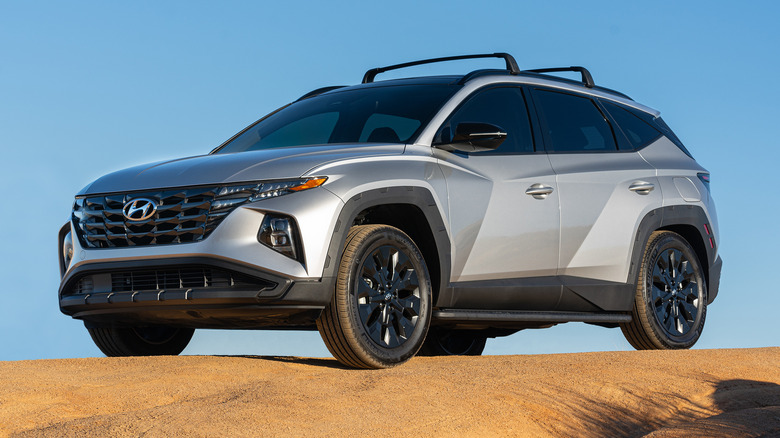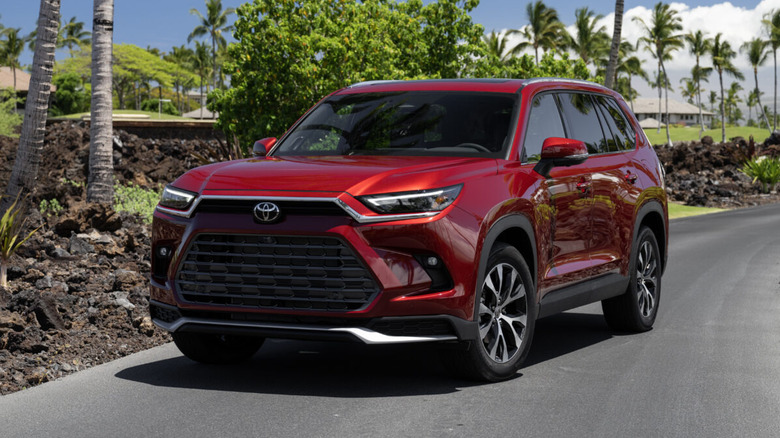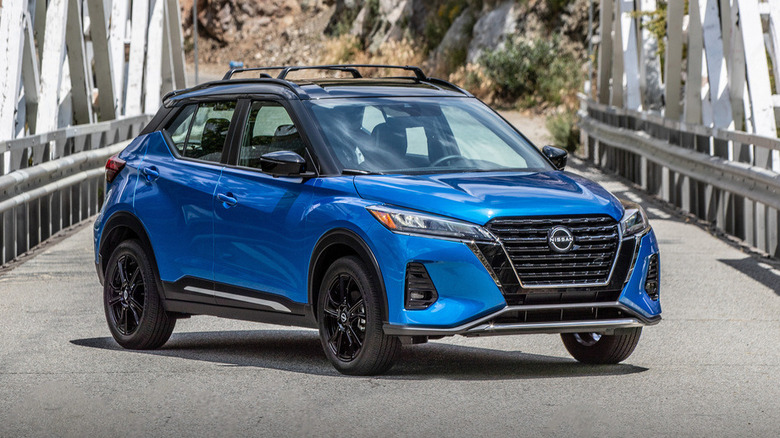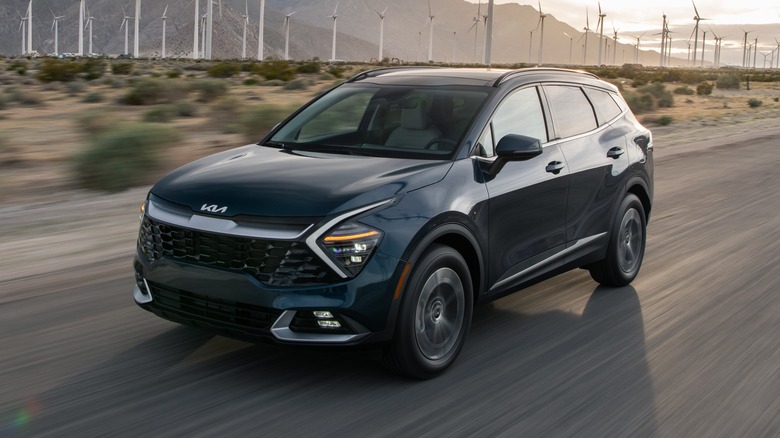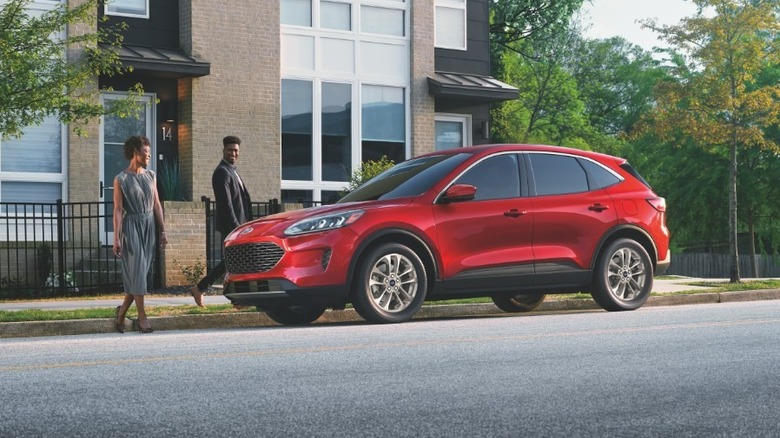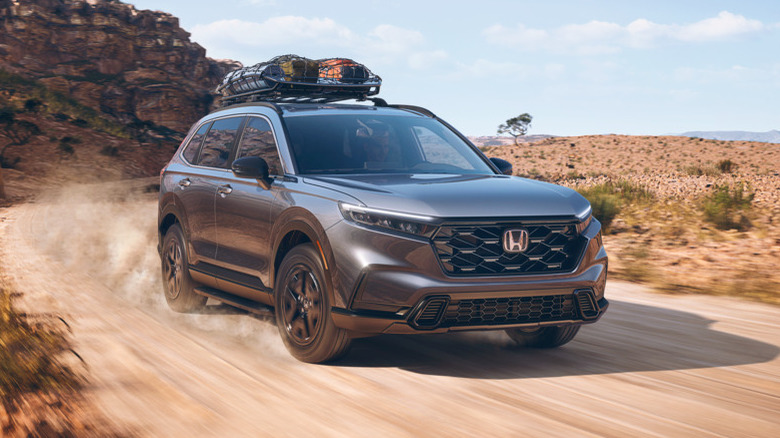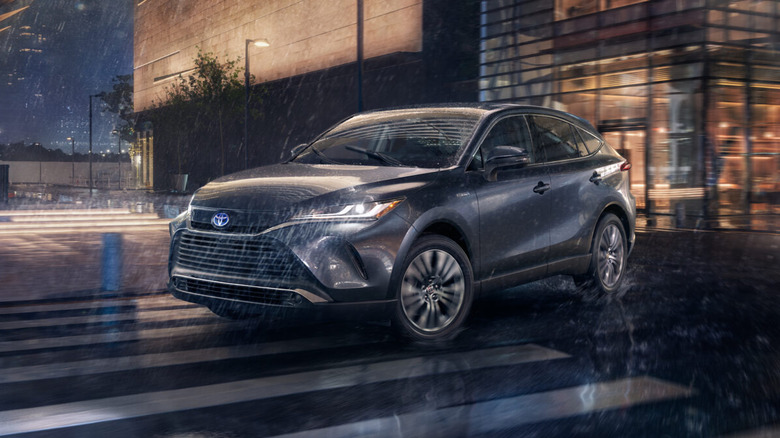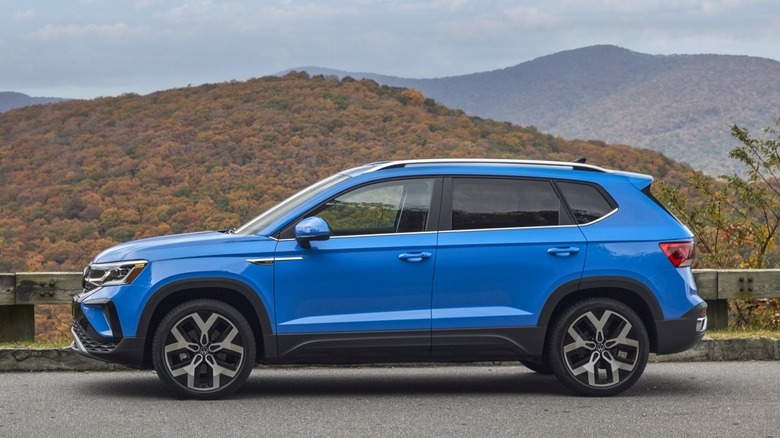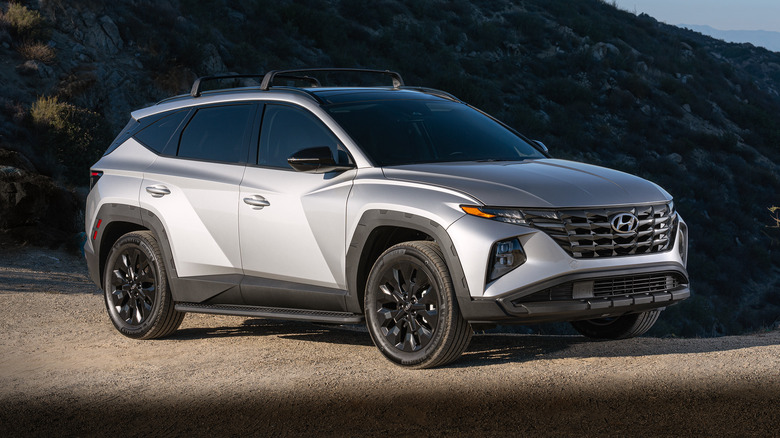8 New SUVs That Are Surprisingly Fuel Efficient
SUVs are infamous for their higher fuel consumption when compared to traditional passenger cars. They're larger, heavier, and often less aerodynamic. They're also one of the most consistently popular segments on the market, continuing to rise in preference with American buyers even in the face of high gas prices and environmental concerns. While the best SUVs still can't match the equivalent passenger cars when it comes to fuel-sipping efficiency, several models on the market boast better EPA ratings than many buyers would expect.
The below SUVs fare particularly well in their respective segments when it comes to efficiency, beating rivals but without leaning too much into the frugal image that makes cars like the Prius a love-or-hate affair. Both hybrid and non-hybrid models are included, however, pure electric vehicles and plug-in hybrids are not. BEVs and PHEVs are well known for their green credentials, but these more traditional SUVs are also surprisingly good choices for saving on fuel.
Toyota Grand Highlander Hybrid – 36 mpg
The 2024 Toyota Grand Highlander Hybrid achieves a combined rating of 36 mpg according to the EPA, with 37 mpg expected in the city and 34 mpg on the highway. That puts it towards the top of its segment for efficiency, which might seem surprising given the interior space on offer. SlashGear spent some time with the 2024 Grand Highlander Hybrid and found it to be exceptionally roomy, being one of the only reasonably priced three-row SUVs where adults could realistically sit in the back row for longer journeys.
The Grand Highlander Hybrid is less reasonably priced when equipped with the Hybrid Max powertrain, but that more powerful 362 horsepower setup also sacrifices efficiency. Its EPA rating drops to 27 mpg combined, and in mixed driving, SlashGear only achieved 22 mpg. For buyers concerned about fuel savings, then, it's the less potent 245 horsepower hybrid setup paired with front-wheel drive that's the sensible choice.
Nissan Kicks – 33 mpg
While it can't quite match the figures of hybrid rivals, the Nissan Kicks is about as efficient as you'll get for a purely combustion-powered SUV. It's rated for a combined 33 mpg, achieving 31 mpg in the city and 36 mpg on the highway, according to the EPA. As Nissan's entry-level crossover SUV, the Kicks competes in a tough segment where a few thousand dollars difference in asking price can make or break its overall appeal. SlashGear recently compared the Kicks to the Subaru Crosstrek, praising its bargain starting price but questioning whether its dated looks and cabin made the Subaru a better pick.
The new 2025 Kicks was recently unveiled, sporting a significantly updated design and a smattering of new infotainment tech, but there's no word from Nissan yet on its efficiency. The 2025 Kicks has a notably larger engine — 2.0L compared to the 2024 car's 1.6L unit — and no hybrid option. So, it seems likely that the EPA figures will take a hit with the new generation, although by how much remains unknown for now.
Kia Sportage Hybrid – 43 mpg
The Kia Sportage Hybrid is among the best-performing SUVs on the market in terms of efficiency, achieving an impressively frugal EPA rating of 42 mpg city, 44 mpg highway, and 43 mpg combined. That figure is only applicable for front-wheel drive versions of the SUV, however — all-wheel-drive cars including the Sport Hybrid are rated for 38 mpg combined. Some cars are only frugal on paper, demanding only the most careful of driving to get anywhere near their claimed mpg figures. Not the Kia: SlashGear saw mileage figures on par with the manufacturer's claims during testing.
There's a lot else to like about the Sportage Hybrid aside from its efficiency. The car's interior is roomy and thoughtfully designed, with durable faux leather and an intuitive infotainment system. Cargo space is also impressive, with 39.5 cubic feet on offer, and front and rear legroom is class-leading. During SlashGear's time with the car, there was some unusual behavior from the hybrid system, which would frequently switch to electric power and then back again when traveling at highway speeds. This was disconcerting at first, although it didn't affect the car's overall efficiency. Other than that, there's not much to dislike, especially given the Kia's competitive starting MSRP of $28,590.
Ford Escape HEV – 39 mpg
The most efficient version of the Ford Escape is the plug-in hybrid, but PHEVs are excluded from this list. After all, few would consider it surprising that an SUV with a separately rechargeable battery is more efficient than one without. What is surprising is how well the mild hybrid Escape fares, with EPA figures of 39 mpg combined, 42 mpg city, and 36 mpg highway. The hybrid setup comprises a 2.5L four-cylinder gas engine and dual electric motors, and to get the best efficiency, you'll need to sacrifice all-wheel-drive and stick with the front-wheel-drive model.
The Escape saw some styling tweaks in 2023, bringing its appearance closer in line with the rest of the Ford lineup and making it one of the sharper-looking SUVs in its segment. Its interior space is competitive too, a nice touch albeit not quite on par with the best in class.
Honda CR-V Hybrid – 40 mpg
Honda's best-selling SUV debuted in sixth generation form in 2023, boasting impressive fuel economy numbers even given the automaker's long-standing focus on efficiency. The CR-V Hybrid achieves an officially rated combined 40 mpg, with 43 mpg city and 36 mpg highway. Achieving maximum efficiency will require not only careful driving but also cranking the regen up to its highest setting. For those not used to driving a hybrid, this might take some getting used to, as SlashGear found the maximum regen caused noticeable slowing as soon as the foot was taken off the gas.
It's not quite a strong enough effect for true one-pedal driving, though, and drivers who aren't so keen can dial the regen strength down to almost undetectable levels. That said, even with the regen turned up to its strongest, the CR-V Hybrid's real-world economy figures fell short of the official estimates in SlashGear's testing. The mixed driving returned around 30 mpg, still more than many rivals but nowhere near the class-leading figure that the EPA suggests.
Toyota Venza – 39 mpg
Achieving maximum fuel efficiency often means sacrificing all-wheel-drive, but not with the Toyota Venza. The 2.5L four-cylinder engine and electric motor are rated for an EPA-certified 39 mpg combined, with 40 mpg city and 37 mpg highway. It was updated for the 2023 model year with added infotainment and safety tech, making it one of the best-equipped Toyota SUVs across all trim levels. Underneath, it shares much of its architecture (including its powertrain) with the RAV4 Hybrid.
It's reasonably powerful compared to its rivals, with 219 horsepower and 163 lb-ft of torque enough to hustle it along highways without fuss. It's by no means a driver's car — you could argue that no car in the Venza's segment fits the bill there — but for affordable, reliable family transport, it ticks all the right boxes. The main downside to the Venza is the tough competition: the market is crowded at its price point, and rivals from the likes of Honda and Hyundai offer the same mix of efficiency and everyday practicality.
Volkswagen Taos – 31 mpg
While its mpg figures might not match up with the best hybrids, for those who prefer to do without electrification, the VW Taos is among the best in its segment. SlashGear reviewed the current generation Taos at launch in 2022 and was impressed with its roomy interior and classy styling, although its interior looked a little dull compared to its rivals. For the 2024 model year, the Taos received a few interior tweaks including some extra tech and contrast interior stitching, but its cabin still lags behind its rivals in visual appeal.
All-wheel-drive is available as an option across all Taos trims, but efficiency figures dip accordingly. The best option for fuel savings is the standard front-wheel-drive layout, with the sole engine option being a 1.5L turbo four-cylinder engine. The engine is smaller than many others in the segment — no doubt one reason why its fuel economy is surprisingly high — but it has the effect of making the Taos less enjoyable to drive than rivals from the likes of Mazda.
Hyundai Tucson Hybrid – 37 mpg
The Hyundai Tucson Hybrid doesn't get a whole lot wrong. It's spacious, affordable, and comes with competitive amounts of infotainment and safety tech even in lower trims. It's also efficient, with an EPA rating of 37 mpg combined, 37 mpg city, and 36 mpg highway. Combustion power is provided by a 1.6L turbocharged four-cylinder engine, which combined with the electrical assistance, produces 226 horsepower. That puts it firmly in the "adequate" category when it comes to power output, with very little punch even with Sport mode engaged but more than enough for everyday urban and highway driving.
Most drivers are unlikely to want to engage Sport mode anyway — the Tucson Hybrid's real appeal comes from its fuel-sipping nature and smooth ride. That, and its ability to carry a small family and its luggage without sacrificing comfort. One criticism SlashGear had of the car was its annoying touch-sensitive controls, which proved unnecessarily finicky to use while driving. Unfortunately, the button-delete trend is not limited to the Tucson Hybrid, with various other cars across Hyundai's range suffering the same problem. If you can live with the unintuitive infotainment controls, however, Hyundai's mid-size family hauler offers a lot for the price.
